

Taking some lumps in the no-lecture model. I have now given 3 class sessions with no lecturing.
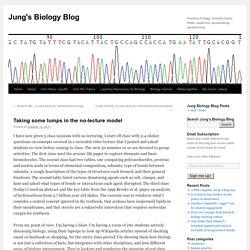
I start off class with 3-4 clicker questions on concepts covered in a recorded video lecture that I posted and asked students to view before coming to class. The next 30 minutes or so are devoted to group activities. The first class used the arsenic life paper to explore elements and basic biomolecules. The second class had two tables, one comparing polysaccharides, proteins and nucleic acids in terms of elemental composition, subunits, type of bonds between subunits, a rough description of the types of structures each formed, and their general functions. The second table listed various denaturing agents such as salt, vinegar, and heat and asked what types of bonds or interactions each agent disrupted. From my point of view, I’m having a blast. The problem is, many of them hate it. I believe that we are missing out on the detailed explanations that the teacher gives us during the lecture.
I don’t like it. I agree on this subject. Big History Project. Terrific Websites for Science. International, independent, illuminated, inspired. 66 Lessons on the Chemistry of Food and Beverages. Reactions is a YouTube channel that I've mentioned in a handful of posts in the past.
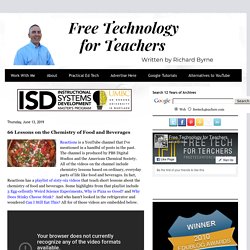
The channel is produced by PBS Digital Studios and the American Chemical Society. All of the videos on the channel include chemistry lessons based on ordinary, everyday parts of life like food and beverages. In fact, Reactions has a playlist of sixty-six videos that teach short lessons about the chemistry of food and beverages. Some highlights from that playlist include 3 Egg-cellently Weird Science Experiments, Why is Pizza so Good? And Why Does Stinky Cheese Stink? Applications for Education All four of the above videos as well as dozens of others in the Food Chemistry playlist could be great to use to help students see how science, specifically chemistry, is a part of everyday life. If you want to use these videos as part of flipped lesson or a classroom discussion, consider using EDpuzzle or Classhook. Physics.org.
PhET: Free online physics, chemistry, biology, earth science and math simulations. Science Fair Project Ideas, Answers, & Tools. USA Hands-On Universe. USA-HOU is hosting the Global HOU conference this year at Western Kentucky University in Bowling Green, Kentucky, 15-21 August 2017, in the path of totality of the 21 August 2017 American Solar Eclipse!
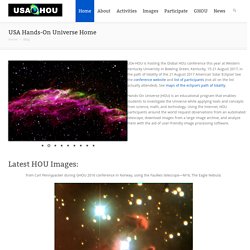
Global Systems Science. OBIS. Home - Playmada Games. Live Science: The Most Interesting Articles, Mysteries & Discoveries. BioInteractive Homepage. Home - Inq-ITS: Standards-aligned, Auto-scored Online Labs for Middle School. Dynamic Periodic Table. Exploratorium Science Snacks. Lessons. Solar System Science Fair Project. Science Fair Projects Solar System 3D Simulator is a FREE software application that generates a realistic solar system model and planets in 3 Dimension on the PC using advanced physics formulas.
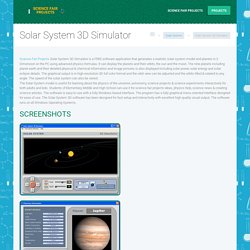
It can display the planets and their orbits, the sun and the moon. The nine planets including planet earth and their detailed physical & chemical information and image pictures is also displayed including solar power, solar energy and solar eclipse details. The graphical output is in high-resolution 3D full color format and the orbit view can be adjusted and the orbits tilted & rotated to any angle. Experiments. Digital Library - Free Educational Labs and Experiments. The Periodic Table of Videos - University of Nottingham. Periodic Table of Tech - The Beacon. Careers in Science. Spongelab. Molecular Workbench. Three Views of MW Senior Scientist and Molecular Workbench Developer Charles Xie, Researcher and Manager Amy Pallant, and Technology and Curriculum Developer Dan Damelin describe the history of Molecular Workbench and our vision for the future.
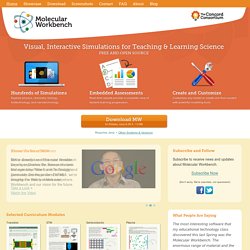
Watch the Video undefinedundefinedundefined Selected Curriculum Modules Transistor Semiconductor Plasma Molecular Rover Chemical Bonding Chemical Resp. Diffusion Heat & Temperature Electrostatics Phase Change DNA to Protein Mission: Immunity Lipids & Carbs Tree of Life Proteins & DNA Harvest Light Quantum Mechanics Crystallography More Modules » Launches MW Create Your Own Simulations MW is not just a collection of simulations—do not be deceived by first glance. Learn More in MW's Online Manual » Launches MW. Connecting People With Plants. Chemistry. Create a Classroom or an eBook. Bringing Science to Life. Science Fair Project Ideas, Answers, & Tools. Honest information about drugs.
Resources to Learn About Outer Space. Outer space is one of the most fascinating topics for students of all ages.
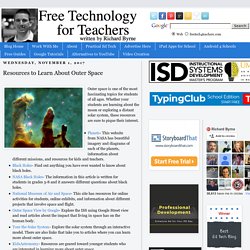
Live Science: The Most Interesting Articles, Mysteries & Discoveries. BioInteractive Homepage. Home - Inq-ITS: Standards-aligned, Auto-scored Online Labs for Middle School. Dynamic Periodic Table. Exploratorium Science Snacks. Lessons. Record and Share Observations of Nature on iNaturalist. iNaturalist is a community website for sharing pictures and observations of plants and animals.
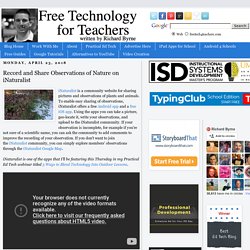
To enable easy sharing of observations, iNaturalist offers a free Android app and a free iOS app. Using the apps you can take a picture, geo-locate it, write your observations, and upload to the iNaturalist community. If your observation is incomplete, for example if you're not sure of a scientific name, you can ask the community to add comments to improve the recording of your observation. If you don't want to join the iNaturalist community, you can simply explore members' observations through the iNaturalist Google Map. iNaturalist is one of the apps that I'll be featuring this Thursday in my Practical Ed Tech webinar titled 5 Ways to Blend Technology Into Outdoor Lessons. Catastrophism? Yes! – Dialogue. A Global Science Community. National Science Teachers Association.